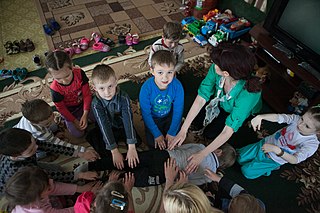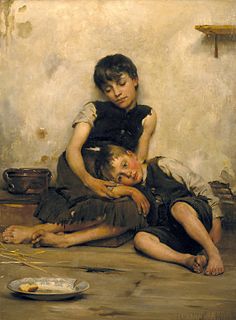Dance/movement therapy (DMT) in USA/ Australia or dance movement psychotherapy (DMP) in the UK is the psychotherapeutic use of movement and dance to support intellectual, emotional, and motor functions of the body. As a modality of the creative arts therapies, DMT looks at the correlation between movement and emotion.
Stanley Greenspan was a clinical professor of Psychiatry, Behavioral Science, and Pediatrics at George Washington University Medical School and a practicing child psychiatrist. He was best known for developing the influential floortime approach for treating children with autistic spectrum disorders and developmental disabilities.
Hearing Voices Networks, closely related to the Hearing Voices Movement, are peer-focused national organisations for people who hear voices and supporting family members, activists and mental health practitioners. Members may or may not have a psychiatric diagnosis. Networks promote an alternative approach, where voices are not necessarily seen as signs of mental illness. Networks regard hearing voices as a meaningful and understandable, although unusual, human variation. In themselves voices are not seen as the problem. Rather it is the relationship the person has with their voices that is regarded as the main issue.

The Tavistock and Portman NHS Foundation Trust is a specialist mental health trust based in north London. The Trust specialises in talking therapies. The education and training department caters for 2,000 students a year from the United Kingdom and abroad. The Trust is based at the Tavistock Centre in Swiss Cottage. The founding organisation was the Tavistock institute of medical psychology founded in 1920 by Dr. Hugh Crichton-Miller. It has long been regarded as a professional centre of excellence of international renown, in its application of psychoanalytic ideas to the study and treatment of mental health and interpersonal dynamics.

Neale Donald Walsch is an American author of the series Conversations with God. He is also an actor, screenwriter, and speaker.
Psychiatric nursing or mental health nursing is the appointed position of a nurse that specialises in mental health, and cares for people of all ages experiencing mental illnesses or distress. These include: neurodevelopmental disorders, schizophrenia, schizoaffective disorder, mood disorders, addiction, anxiety disorders, personality disorders, eating disorders, suicidal thoughts, psychosis, paranoia, and self-harm.
Penelope Jane Leach, is a British psychologist who researches and writes extensively on parenting issues from a child development perspective.

Play therapy refers to a range of methods of capitalising on children's natural urge to explore and harnessing it to meet and respond to the developmental and later also their mental health needs. It is also used for forensic or psychological assessment purposes where the individual is too young or too traumatised to give a verbal account of adverse, abusive or potentially criminal circumstances in their life.
Bibliotherapy is a creative arts therapies modality that involves storytelling or the reading of specific texts with the purpose of healing. It uses an individual's relationship to the content of books and poetry and other written words as therapy. Bibliotherapy is often combined with writing therapy. It has been shown to be effective in the treatment of depression. A 3 year follow up study has suggested that the results are long-lasting.
Health realization (HR) is a resiliency approach to personal and community psychology first developed in the 1980s by Roger C. Mills and George Pransky, and based on ideas and insights these psychologists elaborated from attending the lectures of philosopher and author Sydney Banks. HR first became known for its application in economically and socially marginalized communities living in highly stressful circumstances.

An orphan is a child whose parents have died, are unknown, or have permanently abandoned them.

Katherine Weare is a Professor of Education at the University of Southampton, England.
Personal boundaries or the act of setting boundaries is a life skill that has been popularized by self help authors and support groups since the mid 1980s. It is the practice of openly communicating and asserting personal values as way to preserve and protect against having them compromised or violated The term "boundary" is a metaphor – with in-bounds meaning acceptable and out-of-bounds meaning unacceptable. Without values and boundaries our identities become diffused and often controlled by the definitions offered by others. The concept of boundaries has been widely adopted by the counseling profession.

Don't Forget the Bacon! is a children's book written and illustrated by Pat Hutchins. It was published by Bodley Head in 1976. The story is about a little boy who tries to memorise a list of groceries his mother has asked him to buy. The book has been used as a teaching tool to instruct children about early learning concepts.
Bullying is an undesirable, attacker behavior that often happens among school aged children and adolescents. This behavior is repetitive. Both children who bulled may have serious mental problems. There are different types of bullying such as verbal, social, physical and cyber.
Life story work is a social work intervention with children and adults designed to recognise their past, present, and future. It is prominently used with children who will be adopted, and older adults as part of reminiscence therapies. Life story books are often incorporated into this work to give a visual aid and reminder of important events or feelings.
School-Based Family Counseling (SBFC) is an integrated approach to mental health intervention that focuses on both school and family in order to help children overcome personal problems and succeed at school. SBFC is practiced by a wide variety of mental health professionals, including: psychologists, social workers, school counselors, psychiatrists, and marriage and family therapists, as well as special education teachers. What they all share in common is the belief that children who are struggling in school can be best helped by interventions that link family and school. SBFC is typically practiced at the school site, but may be based in a community mental health agency that works in close collaboration with schools.
Psychodynamic Therapy with Infants and Parents aims to relieve emotional disturbances within the parent(s), the baby, and/or their interaction, for example, postnatal depression and anxiety, infant distress with breastfeeding and sleep, and attachment disorders. It rests on attachment theory and psychoanalysis. Sigmund Freud suggested that a modification of his method could be applied to children, and child analysis was introduced in the 1920s by [Anna Freud].., [Melanie Klein], and Hermine Hug von Hellmuth. Klein speculated on infantile experiences to understand her patients' disorders but she did not practice PTIP. Donald Winnicott, a pediatrician and analyst, focused on the mother-baby interplay in his theorizing and his brief parent-child consultations, but he did not work with PTIP.
Elinor Violet Goldschmied was an English educationalist. Educated at the London School of Economics and qualified as a psychiatric social worker, she worked in an Italian state institution for illegitimate and abandoned children before moving to a home for single mothers in Milan, overseeing changes to the education of children and the training of staff, leading to a transformation of childcare in Italy. Goldschmied developed the concept of "heuristic play" as a means of relax play for babies under the age of two and for maintaining a special relationship with an individual member of staff. She also introduced a "treasure basket" containing non-dangerous household items in a low, open basket, an exploration task that was designed not to have any physical intervention from an overseeing adult.
Suzanna Roffey is a teacher, educational psychologist, academic and author. She is Honorary Associate Professor at University College London and Western Sydney University, Associate Fellow at the University of Exeter, and an Affiliate of the Institute of Wellbeing in Cambridge, UK. She is a Fellow of the British Psychological Society (FBPsS), and a Fellow of the Royal Society of Arts (FRSA). She is a member of the advisory board of the Carnegie Centre of Excellence for Mental Health in Schools, and a past member of the editorial board of Educational and Child Psychology. She was the founder of Wellbeing Australia.





